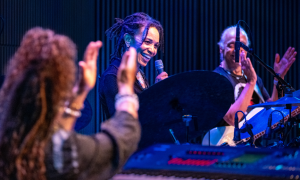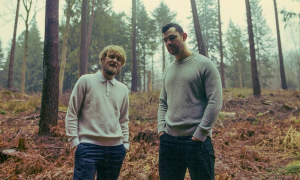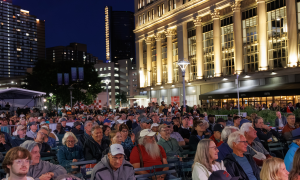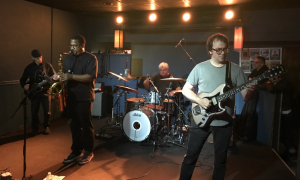Home » Jazz Articles » Live Review » Chick Corea / Gary Burton: San Diego, USA, March 1, 2011
Chick Corea / Gary Burton: San Diego, USA, March 1, 2011
Gary Burton
vibraphoneb.1943

Stan Getz
saxophone, tenor1927 - 1991
Tuesday's concert at Anthology was the first of a two-night residency, which is somewhat unusual for the San Diego venue. The building was almost sold out, and filled with boisterous, enthusiastic listeners. Anthology has almost a million dollars invested in its sound-system, and it's rigged so that every seat in the house is provided an equally stellar audio experience.
Corea approached the microphone, dramatically slimmer than he has been in recent years; whatever he's doing, diet and exercise-wise, is working. The two began with a look at a chart from Corea's My Spanish Heart (Polydor, 1976), "Love Castle," which the duo also recorded on Native Sense: The New Duets (Stretch, 1997). This one had two distinct themes: the first, a sort of rolling, arpeggiated pastoral statement; the second, the archetypal Corea Latin groove. Both men navigated the tune's quirky structure like Jedi warriors, with an expert, fearless and joyful attitude. Burton took the first solo, and here, as elsewhere, he stuck to his modus operandi: tell a story. Burton's solos always have a beginning and an ending, as well as a real-time improvised theme in the middle. Corea followed with a masterful, multidirectional solo of his own, periodically referencing the sly Latin melody.
Native Sense's title track followed, another Corea original, with the pianist setting up an insistent left-hand ostinato while Burton began laying out the melody, which seemed to extend every time he repeated it. The vibraphone master took the initial solo, painting a long melodic landscape, colored by bits of bluesy brushstrokes. Corea opened things up with winding thematic flourishes, intervals based on fourths, and bits of chromatic material.
From there, the duo featured some rarely heard standards, often radically re-harmonized, with arrangements that sometimes took the form of 8-12 page charts. A tribute to pianist

Art Tatum
piano1909 - 1956
Burton comped for Corea with all four mallets and, forty years after pioneering that technique, it was still amazing to watch his incredible dexterity, performed with such casual ease. Morphing back into the written material, an Asian theme emerged—the arrangement, at one point, taking on the nature of a Chinese

Return to Forever
band / ensemble / orchestraAfter such tightly wound material, it was a relief to hear Corea announce

Thelonious Monk
piano1917 - 1982
The pair continued, with a massive yet oblique arrangement of

Antonio Carlos Jobim
piano1927 - 1994
The duo recovered nicely, though, with the second indelible highlight of the evening, a picture-perfect reading of Lennon/McCartney jewel, "Eleanor Rigby." Corea chose a busy ostinato to set things up for his right hand, which plinked out the melody in single notes, and then harmonized it the second time around. Burton ripped into his best solo of the night, his mallets chasing after one another and crashing into lush chordal cloudbursts. It was highly reminiscent of his quartet work with guitarist

Pat Metheny
guitarb.1954
Corea then took to the microphone to introduce the set's penultimate tune, a reading of "My Ship," inspired by the

Miles Davis
trumpet1926 - 1991

Gil Evans
composer / conductor1912 - 1988

McCoy Tyner
piano1938 - 2020
The evening came to a close with a wild journey through a Return To Forever staple, the title track to No Mystery (Polydor, 1975). Despite another expansive arrangement, there was enough familiarity to keep the sight-reading less obvious. Its well-known staccato theme was performed in perfect unison, lock-step, and the treatment featured insanely fast trading between the two. There were whiplash solo statements and contrapuntal segments that brought the best of the 1970s to the fore.
That was supposed to be it, but the crowd, which had been wildly enthusiastic throughout the entire concert, would not be denied. After several moments of ensemble-clapping, Burton and Corea returned to play an unnamed fusion tour-de-force, which actually upped the ante on virtuosic unison fireworks. It seemed impossible that two human beings could play such intricately melodic material, at that speed, in unison. The impossible was, however, clearly familiar territory for Corea and Burton.
Tags
Chick Corea / Gary Burton
Live Reviews
Chick Corea
Robert Bush
United States
Gary Burton
Stan Getz
Art Tatum
Return To Forever
Thelonious Monk
Antonio Carlos Jobim
pat metheny
Miles Davis
Gil Evans
McCoy Tyner
Comments
PREVIOUS / NEXT
Support All About Jazz
 All About Jazz has been a pillar of jazz since 1995, championing it as an art form and, more importantly, supporting the musicians who make it. Our enduring commitment has made "AAJ" one of the most culturally important websites of its kind, read by hundreds of thousands of fans, musicians and industry figures every month.
All About Jazz has been a pillar of jazz since 1995, championing it as an art form and, more importantly, supporting the musicians who make it. Our enduring commitment has made "AAJ" one of the most culturally important websites of its kind, read by hundreds of thousands of fans, musicians and industry figures every month.

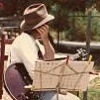





 Buy Now
Buy Now




